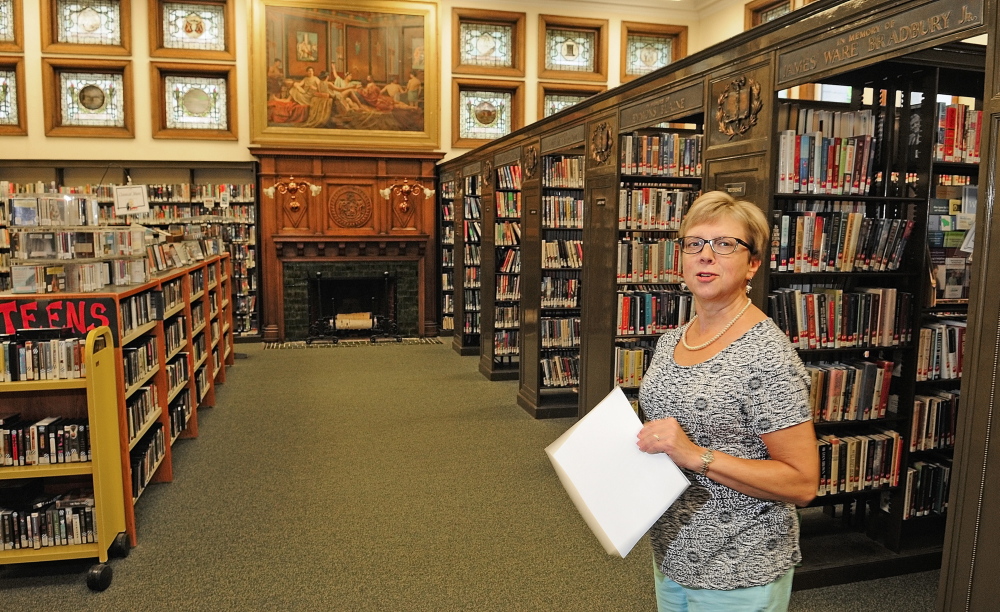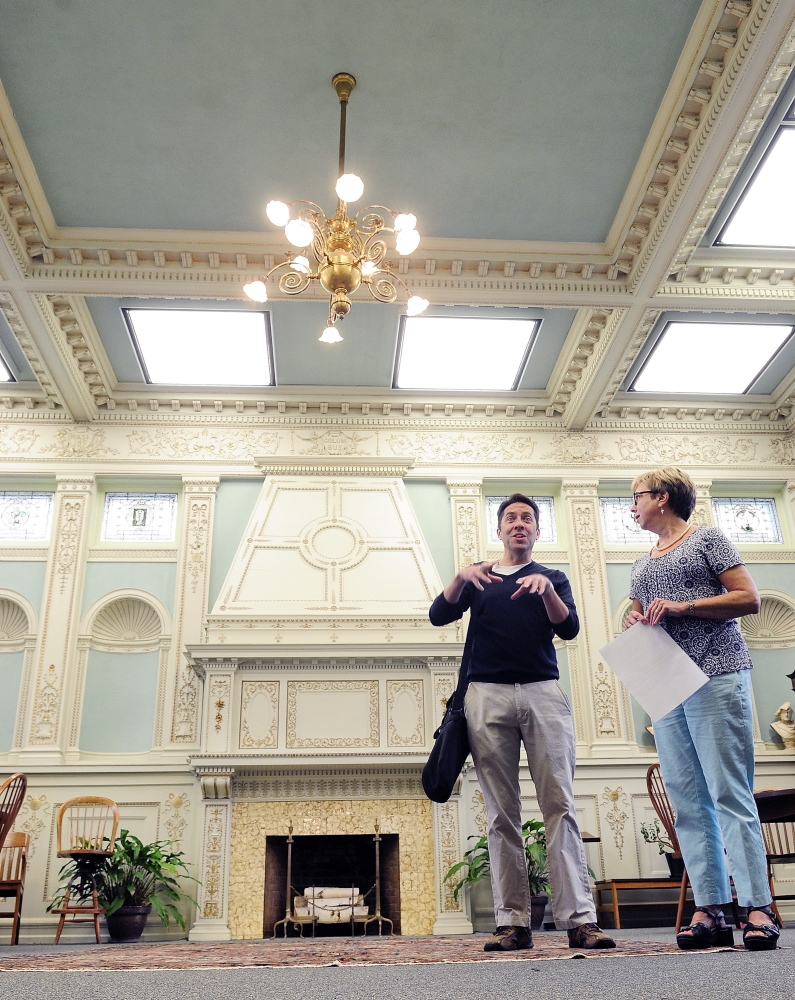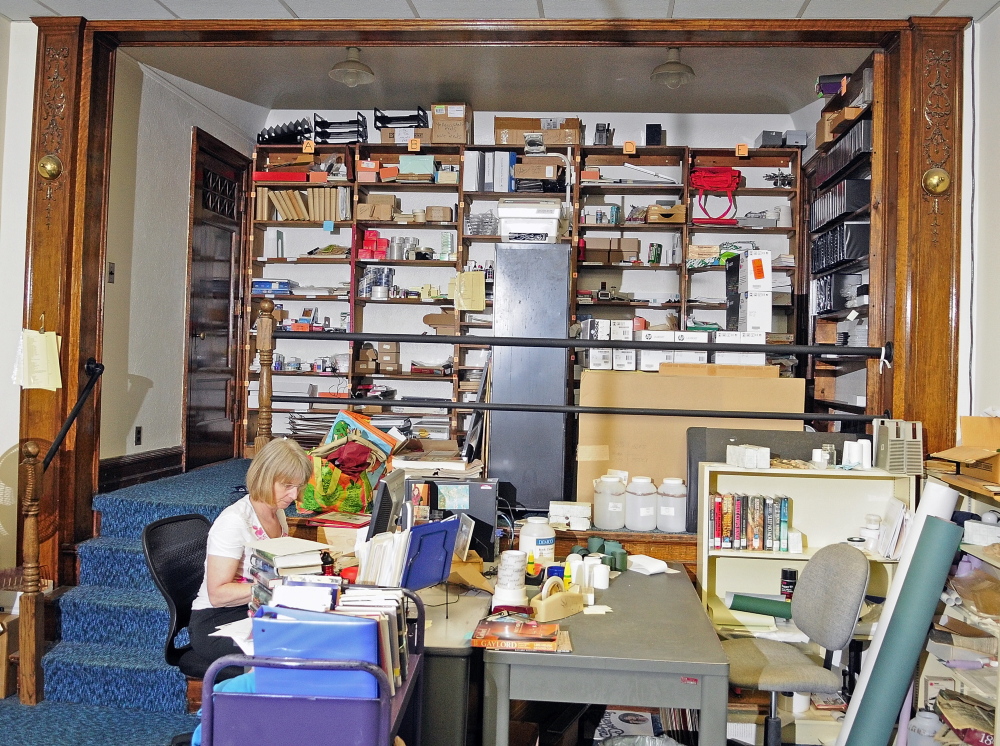AUGUSTA — Like a worn-out sweater, the Lithgow Library’s frayed strings shouldn’t be pulled because the whole building could unravel, supporters say.
That image is how library supporters are making their “Save Lithgow” campaign pitch ahead of an upcoming bond proposal to expand and renovate the historic public library built in 1896. Voters will decide the $8 million proposal at a June 10 referendum.
While no problem is likely to cause the building to collapse if it’s not renovated, Wick Johnson said the “Save Lithgow” campaign language is genuine in that the building’s issues need to be addressed if it is to remain a viable, functional library long-term.
To address the library’s problems one at a time without making any significant changes to the building itself would be throwing good money after bad, Johnson said.
“Why spend a couple of million on something that doesn’t work?” said Johnson, co-chairman of the capital campaign raising private funds for the project. “These renovations will stand the test of time. And it’ll never be less expensive to do than it is today.”
The campaign has raised about $1.5 million in cash and expects to have $2.5 million in combined cash and pledges before the bond vote to help pay for an estimated total cost of $11.7 million for the renovation and expansion.
The renovation and expansion would nearly triple the size of the library. It would also address numerous issues at the library, including an obsolete elevator not accessible by people in some wheelchairs and not up to Americans with Disabilities standards; a still-leaky roof; safety and security concerns because of staff not being able to view or monitor the main entrance; an inefficient and obsolete heating and ventilation system; and the overriding issue of just not enough room for books, computers, programs and people.
Lithgow’s elevator was installed as part of the boxy and unattractive addition stuck onto the original structure in 1979 and is so obsolete that the manufacturer no longer makes parts for it. If it were to fail, replacing it would be pricey, and the new elevator to replace it would be required to meet Americans with Disabilities Act standards. That means the elevator shaft and associated infrastructure would need to be bigger, further reducing the already packed space housing the library’s collections.
BUILDING ISSUES
The lack of space in the library, which is on the National Register of Historic Places, is behind many of the building’s issues.
With only so much space available, collections of books are stacked so close together, some within 28 inches of other stacks, there isn’t enough room for people to even turn around in the stacks.
Elizabeth Pohl, the library’s director, said 36 inches between stacks is the minimum allowed under the Americans with Disabilities Act, and 48 inches is preferable.
Books are stacked along window sills, because there’s no other space for them to go.
Because there is so little room, the library has only a few computers available for use by the public, four for adults and three for children. Pohl said by current standards a library serving a population of Augusta’s size should have at least 25 to 30 computers for use by the public.
There are only two study kiosks in the whole library and few quiet places where someone could study or read at a desk.
Supporters also say that staff don’t have adequate work space, there is very little space to host live readings or other performances, and there is no dedicated teen space in the library.
“We don’t have any place for teens, and that’s a real lack in the community,” Pohl said. “It’s so important for kids to have a place to go after school, to study, to socialize. Librarians with teen areas in their libraries say it is one of the most important places in their library.”
David Madore, who is on the board of the capital campaign and the Friends of Lithgow Library, said the need to expand the library “isn’t just about bricks and mortar. It’s about what the library brings to the community.”
The planned new entrance to the library would face toward Oak Street, and staff at the main desk could see the entrance, something they can’t see now from the main desk.
Also unable to be easily monitored by staff are the entrances to the library’s public bathrooms, which are in the basement off a hallway which abuts the children’s area of the library.
PAYING UP
When it rains, Lithgow has leaks, even though the roof of the 1979 addition was replaced just a few years ago at a cost of about $30,000.
Bob LaBreck, facilities manager for the city, said the leak is associated with the connection between the historic building and the 1979 addition. Water-damaged walls are visible in multiple locations in the library.
A financing plan put together by City Manager William Bridgeo and Ralph St. Pierre, finance director and assistant city manager, would allow the city to bond the library project without requiring a property tax increase.
The 15-year bond proposal going to voters June 10 is for a total bond amount of $15.6 million, with $8 million for the library and $7.6 million to refinance existing city employee pension debt the city already owes.
By refinancing the pension debt for a longer period of time, Bridgeo said the city’s payments for both the library and pension debt would be less than the current, approximately $2 million a year it’s paying on the pension debt now.
St. Pierre said the city would save $202,000 by taking out the new bond. That money, he said, will more than cover the anticipated additional operating costs of the larger library, including the need for two or three new staff members.
Voters in 2007 rejected, by 243 votes, the first bond proposal seeking to address similar building problems.
State Sen. Roger Katz, who was Augusta’s mayor at the time, spoke against the 2007 bond proposal because he thought it relied too heavily on public money and would have required a significant property tax increase.
However, Katz said he supports now both the proposed library renovation and expansion and the bond proposal to pay for it.
“The Friends of Lithgow have done a tremendous job with their campaign. I look at it now as really a public-private partnership,” Katz said. “There was never really any question about the need to renovate. Lithgow is one of our real gems in Augusta. The private fundraising and creative funding plan put together by the city make it a real winner.”
St. Pierre said one-time savings of about $1.3 million the city will gain by avoiding an otherwise upcoming bond payment on the pension debt, if the bond is approved by voters, would be used to cover the estimated $600,000 cost of leasing temporary space for the approximately 18 months it’s expected to take to build a new library.
He said Bridgeo made an inquiry with Hannaford supermarket about possibly leasing the former Willow Street Hannaford to be used as a temporary library while construction is underway.
Johnson and other library proponents expressed optimism the library bond will pass this time around, noting they’ve spoken with people who opposed it before but support it fully now.
They noted usage of the library is at an all-time high, with 133,500 visits last year. A study released in February found that 87 percent of library card-holders are Augusta residents, with nonresidents paying a fee for their cards. The study found 11,300 Augusta residents, or 60 percent of the population, have library cards.
In addition, the study found 95 percent of library users use the library’s computers, and 49 percent of library computer users are low-income, 62 percent use the library’s computers to seek jobs, 29 percent use Lithgow resources to apply for a job and 75 percent use the library’s technology for educational purposes.
“The building issues in 2014 are still here from 2007, but in the meantime usage has gone up,” Pohl said. “We’re doing the best we can. But at some point you can’t do it anymore.”
Keith Edwards – 621-5647kedwards@centralmaine.comTwitter: @kedwardskj
Copy the Story LinkSend questions/comments to the editors.







Success. Please wait for the page to reload. If the page does not reload within 5 seconds, please refresh the page.
Enter your email and password to access comments.
Hi, to comment on stories you must . This profile is in addition to your subscription and website login.
Already have a commenting profile? .
Invalid username/password.
Please check your email to confirm and complete your registration.
Only subscribers are eligible to post comments. Please subscribe or login first for digital access. Here’s why.
Use the form below to reset your password. When you've submitted your account email, we will send an email with a reset code.